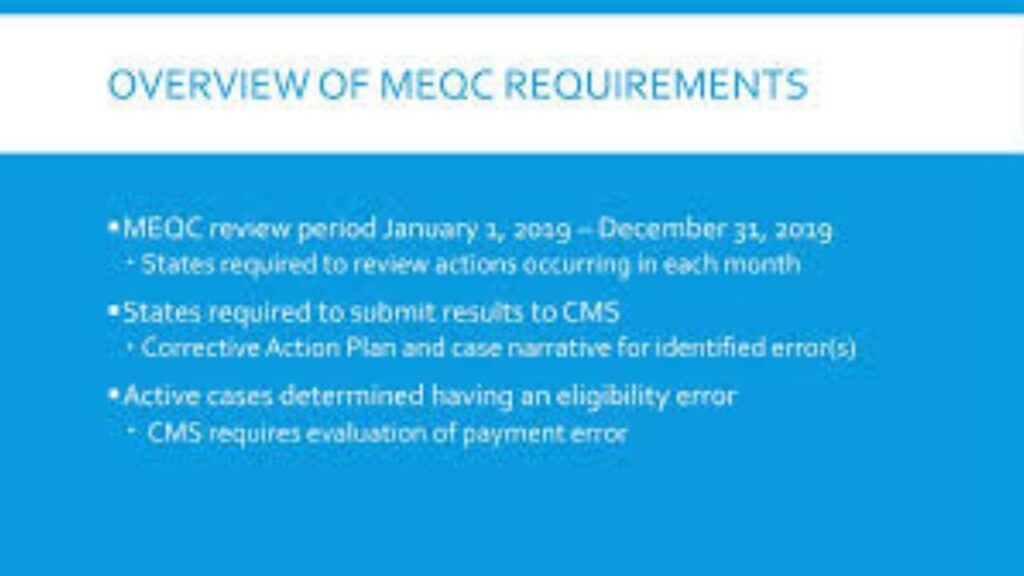Introduction
MEQC Hours Annually Per State Program (MEQC) plays a crucial role in ensuring that Medicaid programs across the United States operate efficiently, accurately, and in compliance with federal regulations. To maintain program integrity, each state is required to allocate a certain number of MEQC hours annually per state program. These hours are essential for monitoring and reviewing Medicaid eligibility determinations, helping to prevent errors, fraud, and abuse. This article will explore what MEQC hours are, how states allocate them, and why they are vital for Medicaid programs.
Overview of MEQC (Medicaid Eligibility Quality Control)
The MEQC program was established to help states improve the accuracy of their Medicaid eligibility determinations. By conducting regular reviews and audits, states can identify potential errors and implement corrective actions to ensure that Medicaid benefits are only provided to eligible individuals. MEQC hours refer to the time allocated by state programs to carry out these reviews, ensuring compliance with federal standards and maintaining the integrity of Medicaid programs.
Importance of MEQC Hours for State Programs
MEQC hours are not just a requirement—they are a critical tool for safeguarding the Medicaid system. By dedicating the necessary time to quality control activities, states can reduce improper payments, detect fraud, and improve the overall efficiency of their Medicaid programs. Failing to meet MEQC hour requirements can result in compliance issues, increased costs, and potential penalties.
What Are MEQC Hours?
Defining MEQC and Its Role in Medicaid Compliance
MEQC hours are the time spent by state Medicaid programs on activities related to eligibility quality control. This includes reviewing case files, conducting audits, and analyzing data to ensure that Medicaid benefits are correctly awarded. These activities help states meet federal compliance standards and improve the accuracy of their eligibility determinations.
The Purpose of Tracking MEQC Hours Annually
Tracking MEQC hours on an annual basis allows states to monitor their compliance with federal requirements and assess the effectiveness of their quality control efforts. By documenting the time spent on MEQC activities, states can identify areas that need improvement and ensure that they are dedicating sufficient resources to maintaining program integrity.
MEQC Requirements by State
How Different States Allocate MEQC Hours Annually
The number of MEQC hours required annually can vary from state to state, depending on the size of the Medicaid program, the number of beneficiaries, and other factors. Each state is responsible for determining how to allocate these hours across its various Medicaid programs, ensuring that all aspects of eligibility determination are thoroughly reviewed.
Examples of State Programs and Their Specific MEQC Hours
For example:
- California might allocate a significant portion of its MEQC hours to reviewing eligibility determinations in densely populated urban areas with high Medicaid enrollment.
- Montana, with a smaller Medicaid population, might focus more of its MEQC efforts on rural regions where access to care and accurate eligibility determinations can be more challenging.
These allocations reflect each state’s unique challenges and priorities in maintaining Medicaid program integrity.
Compliance and MEQC Reporting
Meeting Annual Requirements: What States Need to Do
To remain in compliance with federal regulations, states must meet their MEQC hour requirements annually. This involves conducting regular reviews, submitting reports to federal agencies, and implementing corrective actions as needed. States must ensure that their MEQC activities are documented and that all hours are accounted for in their reports.
Key Deadlines and Reporting Processes for MEQC Compliance
Each state is required to submit MEQC reports annually, outlining the hours spent on quality control activities and the findings from those reviews. These reports must be submitted by specific deadlines to the Centers for Medicare & Medicaid Services (CMS). Missing these deadlines or failing to meet MEQC hour requirements can result in compliance issues and potential penalties for the state.
Benefits of MEQC Hours for State Programs
Ensuring Accuracy in Medicaid Eligibility Determinations
One of the primary benefits of dedicating sufficient MEQC hours to quality control activities is the increased accuracy in Medicaid eligibility determinations. By thoroughly reviewing cases, states can ensure that only eligible individuals receive benefits, reducing the risk of improper payments and protecting program resources.
How MEQC Improves Program Integrity and Reduces Fraud
MEQC hours are also essential for detecting and preventing fraud within Medicaid programs. By conducting regular audits and reviews, states can identify suspicious activity, investigate potential cases of fraud, and take corrective actions to prevent further abuse. This not only protects state resources but also ensures that Medicaid benefits are available to those who truly need them.
Challenges in MEQC Compliance
Common Issues States Face When Meeting MEQC Hour Requirements
Despite the importance of MEQC hours, many states face challenges in meeting these requirements. Common issues include:
- Resource Constraints: Limited staffing or budgetary resources can make it difficult for states to dedicate sufficient time to MEQC activities.
- Data Management: Managing large volumes of data and ensuring that all reviews are properly documented can be a significant challenge for state programs.
- Complex Regulations: Navigating the complex federal regulations governing MEQC activities can be difficult, leading to compliance issues.
Strategies for Overcoming MEQC Compliance Challenges
To overcome these challenges, states can adopt several strategies:
- Leverage Technology: Using data management software and automated tools can help streamline MEQC activities and reduce the burden on staff.
- Focus on Training: Providing ongoing training to staff involved in MEQC activities ensures that they are familiar with the latest regulations and best practices.
- Collaboration: Working with other states to share resources and best practices can help improve MEQC compliance across the board.
Best Practices for States
Tips for Efficiently Meeting MEQC Hour Requirements
To efficiently meet MEQC hour requirements, states should consider the following best practices:
- Plan Ahead: Develop a clear plan for how MEQC hours will be allocated throughout the year, ensuring that all necessary activities are covered.
- Monitor Progress: Regularly review the progress of MEQC activities to ensure that the state is on track to meet its annual requirements.
- Engage Stakeholders: Involve key stakeholders, including program administrators, policymakers, and beneficiaries, in the MEQC process to ensure that all perspectives are considered.
Leveraging Technology for Accurate MEQC Tracking
Technology can play a crucial role in helping states track and document their MEQC hours. By using specialized software, states can automate data collection, streamline reporting processes, and ensure that all activities are properly documented. This not only improves efficiency but also reduces the risk of errors in MEQC reporting.
Conclusion
Meeting the MEQC hours annually per state program is a critical requirement for maintaining Medicaid program integrity. By dedicating the necessary For detailed information about MEQC requirements, including specific guidelines for your state, you can visit the Centers for Medicare & Medicaid Services (CMS) website or contact your state Medicaid office.
Also Read : Ilaca bak ketlar : Uses, Dosage, Side Effects, and Precautions
FAQs
What are MEQC hours?
MEQC hours refer to the time spent by state Medicaid programs on activities related to Medicaid Eligibility Quality Control (MEQC), including case reviews, audits, and compliance monitoring.
Why are MEQC hours important for state programs?
MEQC hours are essential for ensuring that Medicaid benefits are accurately awarded, preventing fraud, and maintaining program integrity. They help states comply with federal regulations and improve the efficiency of their Medicaid programs.
How do states allocate MEQC hours annually?
Each state allocates MEQC hours based on the size of its Medicaid program, the number of beneficiaries, and other factors. States determine how to distribute these hours across various quality control activities to ensure compliance.
What challenges do states face in meeting MEQC hour requirements?
Common challenges include resource constraints, data management issues, and navigating complex federal regulations. States must address these challenges to ensure compliance with MEQC requirements.
How can states improve their MEQC compliance efforts?
States can improve MEQC compliance by leveraging technology, providing staff training, collaborating with other states, and developing clear plans for meeting MEQC hour requirements.
Where can I find more information about MEQC requirements for my state?
For detailed information about MEQC requirements, including specific guidelines for your state, you can visit the Centers for Medicare & Medicaid Services (CMS) website or contact your state Medicaid office.



